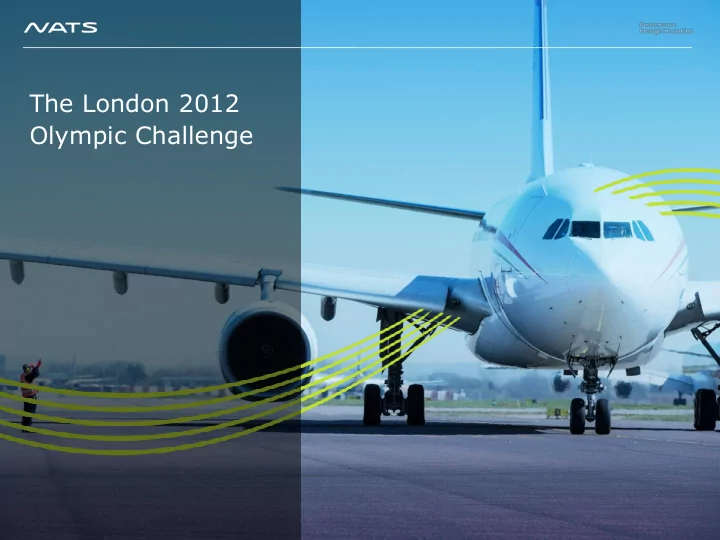

The London 2012 Olympic Challenge
Paul Haskins General Manager, London Terminal Control Brian Wheeler Operations Supervisor, London Terminal Control
The Size of the Challenge?
Departures Heathrow
Departures Heathrow, Gatwick
Departures Heathrow, Gatwick, Stansted
Departures Heathrow, Gatwick, Stansted, Luton
Departures Heathrow, Gatwick, Stansted, Luton, London City
Arrivals Heathrow
Arrivals Heathrow, Gatwick
Arrivals Heathrow, Gatwick, Stansted
Arrivals Heathrow, Gatwick, Stansted, Luton
Arrivals Heathrow, Gatwick, Stansted, Luton, London City
Departures & Arrivals Heathrow, Gatwick, Stansted, Luton, London City
Half a million overseas spectators 70,000 overseas ‘Olympics Family’ members; 150 Heads of State flights 700 extra commercial flights into London’s main airports; 10,000 business jet movements.
Maintain and maximise capacity of London’s core airports Create extra capacity to satisfy a significant expected increase in IFR movements to London’s secondary airports
Departures & Arrivals Demand from 40 airports
Accommodating the biggest ever Military Operation during peacetime in the UK Multiple fixed wing and rotary fighter and surveillance aircraft
Adjacent ANSP Partners Co-ordination and agreements
Delivering the Solution
Building Critical Relationships; UK Ministry of Defence UK Department for Transport UK Home Office UK Civil Aviation Authority Business & General Aviation Community Commercial airlines IATA Airport operators Airport Coordination Ltd Eurocontrol UK and European Meteorological Offices LOCOG Media and politicians
Dealing with the risks; The UK Aviation Network faced risk of significant ATM delay throughout the Olympics Security restrictions/flights/interceptions affecting civil use of airspace Weather disruption and ability to recover from disruption Additional demand to secondary airfields and non adherence to allocated runway slots
Making the preparations; Creation of new temporary controlled airspace A bespoke Military command centre alongside the civil operation Business & General Aviation briefing and communications Media, political and customer communication programmes ATICCC live throughout
New Temporary Controlled Airspace; Three new areas of controlled airspace - designed, consulted and approved 4 new holds plus new arrival routes Additional contingency airspace Intensive simulator evaluation Consultation with leisure flying community, Military and local communities
Bespoke Military Solution; Temporary Ops Room, Procedures and equipment built and equipped by NATS Managed all flights operating outside CAS in the London area Managed all Flight Plans Statistics 34 Days of operation 18,575 flight plans processed 10,739 aircraft controlled
Business and GA Outreach; Presentations around the world to discuss the Olympics airspace Publicity material detailing the changes including leaflets, podcasts, articles and online tutorials. Telephone hotline and information hub, set up to help the business and GA communities understand the changes and the requirements regarding flight planning.
Stakeholder, Media and Political Engagement; A year of detailed preparatory work with more than 100 commercial airlines Media campaign to raise awareness of the Olympics and the changes to airspace. Briefings for UK and international print and broadcast journalists Briefings for UK Defence and Transport Ministers, Members of Parliament and senior Military Commanders
Air Traffic Incident Crisis Communications Cell (ATICCC); Value established during the Volcano Live throughout Olympics with up to 3 calls per day; text/email updates; ability to run operator liaison cell Single point of truth for UK ATM: Included NATS Centres, FMP , UK and European Met Office, DfT, CAA, Eurocontrol, IAA and Airports Airfield status map updated daily via live portal
The Results
“NATS’ management of traffic across the entire UK network with delays substantially down versus last year, including special slot coordination across 40 airports without any major incidents and using the NATS coordination and communication cell, has led to a great success for the UK transport industry” IATA
The Statistics London Airspace handled 6,000 flights per day. 3.5% - 4.5% increase in traffic 26 July = 59% increase in general aviation and business aviation flights 9,708 total Business Aviation slot bookings 11 infringements of NATS Controlled Airspace Three security launches with minimal impact on airline operation A number of significant weather days London Airspace handles 6,000 flights per day. 3.5% extra
Service In one of the most challenging periods ever for UK air traffic, NATS generated just 0.1% of total European delay attributable to ATC, despite handling nearly 25% of Europe’s traffic
Safety No risk bearing losses of separation attributed to the Olympics. No systems issues. Just 11 infringements of NATS controlled airspace by GA aircraft.
Communications Website had 126,308 visits by 82,411 unique visitors Olympics airspace guide distributed to 60,000 flying schools, aerodromes and events Reached over 8 Million people
“ What I experienced was one of the most professionally run ATM facilities I’ve had the pleasure to visit” Roberto Gonzalez, Senior FAA representative, London office
“ We have received glowing positive feedback from numerous sources regarding the work of the team and the outstanding support that they received from NATS” Assistant Chief of the Air Staff, Royal Air Force
Summary Fours years in the planning, NATS is very proud it could play it’s part in the success of London 2012, providing a safe and efficient operation despite the huge challenges faced when delivering a project of this size and importance. NATS is the UK based global provider of air traffic services and solutions.
NATS can be found in Exhibition Hall 9, Stand 890. Questions?
Recommend
More recommend